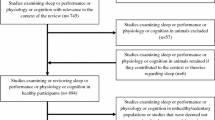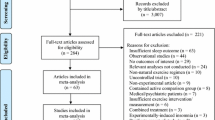Abstract
Primates spend almost half their lives asleep, yet little is known about how sleep influences their waking cognition. We hypothesized that diurnal and cathemeral lemurs differ in their need for consistent, non-segmented sleep for next-day cognitive function—including long-term memory consolidation, self-control, foraging efficiency, and sociality. Specifically, we expected that strictly diurnal Propithecus is more reliant on uninterrupted sleep for cognitive performance, as compared to four other lemur species that are more flexibly active (i.e., cathemeral). We experimentally inhibited sleep and tested next-day performance in 30 individuals of 5 lemur species over 960 total nights at the Duke Lemur Center in Durham, North Carolina. Each set of pair-housed lemurs experienced a sleep restriction and/or deprivation protocol and was subsequently tested in a variety of fitness-relevant cognitive tasks. Within-subject comparisons of performance on these tasks were made by switching the pair from the experimental sleep inhibited condition to a normal sleep environment, thus ensuring cognitive equivalency among individuals. We validated effectiveness of the protocol via actigraphy and infrared videography. Our results suggest that ‘normal’ non-disrupted sleep improved memory consolidation for all lemurs. Additionally, on nights of normal sleep, diurnal lemurs performed better in foraging efficiency tasks than cathemeral lemurs. Social behaviors changed in species-specific ways after exposure to experimental conditions, and self-control was not significantly linked with sleep condition. Based on these findings, the links between sleep, learning, and memory consolidation appear to be evolutionarily conserved in primates.



Similar content being viewed by others
References
Albrecht U (2012) Circadian rhythms and sleep: the metabolic connection. Eur J Physiol 463:23–30
Ambrosini M, Mariucci G, Colarieti L, Bruschelli G, Carobi C, Giuditta A (1993) The structure of sleep is related to the learning ability of rats. Eur J Neurosci 5:269–275
Andersen ML, Diaz MP, Murnane KS, Howell LL (2013) Effects of methamphetamine self-administration on actigraphy-based sleep parameters in rhesus monkeys. Psychopharmacology 227:101–107. https://doi.org/10.1007/s00213-012-2943-2
Barrett CE, Noble P, Hanson E, Pine DS, Winslow JT, Nelson EE (2009) Early adverse rearing experiences alter sleep–wake patterns and plasma cortisol levels in juvenile rhesus monkeys. Psychoneuroendocrinology 34:1029–1040. https://doi.org/10.1016/j.psyneuen.2009.02.002
Bartoń K (2015) Package ‘MuMIn’: multi-model inference. R package version 1.15.6
Basner M, Rao H, Goel N, Dinges DF (2013) Sleep deprivation and neurobehavioral dynamics. Curr Opin Neurobiol 23:854–863
Bates D, Maecher M, Bolker B, Walker S (2015) Fitting linear mixed-effects models using lme4. J Stat Softw 67:1–48
Beaulieu I, Godbout R (2000) Spatial learning on the Morris Water Maze Test after a short-term paradoxical sleep deprivation in the rat. Brain Cogn 42:27–31
Bonnet M, Arand D (2005) Acute sleep deprivation. In: Kryger M, Roth KT, Dement W (eds) Principles and practices of sleep medicine. Elsevier Saunders, Philadelphia
Bray J, Samson DR, Nunn CL (2017) Activity patterns in seven captive lemur species: evidence of cathemerality in Varecia and Lemur catta? Am J Primatol. https://doi.org/10.1002/ajp.22648
Capellini I, McNamara P, Preston B, Nunn C, Barton R (2009) Does sleep play a role in memory consolidation? A comparative test. PLoS One. https://doi.org/10.1371/journal.pone.0004609
Colquhoun IC (2006) Predation and cathemerality: comparing the impact of predators on the activity patterns of lemurids and ceboids. Folia Primatol 77:143–165. https://doi.org/10.1159/000089701
Curtis DJ, Rasmussen MA (2006) The evolution of cathemerality in primates and other mammals: a comparative and chronoecological approach. Folia Primatol 77:178–193. https://doi.org/10.1159/000089703
Curtis DJ, Zaramody A, Martin RD (1999) Cathemerality in the mongoose lemur Eulemur mongoz. Am J Primatol 47:279–298. https://doi.org/10.1002/(SICI)1098-2345(1999)47:4%3C279::AID-AJP2%3E3.0.CO;2-U
Datta S (2000) Avoidance task training potentiates phasic pontine-wave density in the rat: a mechanism for sleep-dependent plasticity. J Neurosci 20:8607–8613
Diamond A (1990) Developmental time course in human infants and infant monkeys and the neural bases of inhibitory control in reaching. Ann N Y Acad Sci 608:637–676
Donati G, Borgognini-Tarli SM (2006) From darkness to daylight: cathemeral activity in primates. J Anthropol Sci 84:7–32
Donati G, Santini L, Razafindramanana J, Boitani L, Borgognini-Tarli S (2013) (Un-)expected nocturnal activity in “diurnal” lemur catta supports cathemerality as one of the key adaptations of the lemurid radiation. Am J Phys Anthropol 150:99–106
Durmer JS, Dinges DF (2005) Neurocognitive consequences of sleep deprivation. Semi Neurol 25:117–129. https://doi.org/10.1055/s-2005-867080
Goel N, Rao H, Durmer JS, Dinges DF (2009) Neurocognitive consequences of sleep deprivation. Semin Neurol 29:320–339
Gruart-Masso A, Nadal-Alemany R, Coll-Andreu M, Portell-Cortès I, Martí-Nicolovius M (1995) Effects of pretraining paradoxical sleep deprivation upon two-way active avoidance. Behav Brain Res 72:181–183
Halassa MM, Florian C, Fellin T, Munoz JR, Lee SY, Abel T, Frank MG (2009) Astrocytic modulation of sleep homeostasis and cognitive consequences of sleep loss. Neuron 61:213–219
Hobson JA, Pace-Schott EF (2002) The cognitive neuroscience of sleep: neuronal systems, consciousness and learning. Nat Rev Neurosci 3:679–693
Kantha SS, Suzuki J (2006) Sleep profile and longevity in three generations of a family of captive Bolivian Aotus. Int J Primatol 27:779–790
LaFleur M, Sauther M, Cuozzo F, Yamashita N, Youssouf IAJ, Bender R (2014) Cathemerality in wild ring-tailed lemurs (Lemur catta) in the spiny forest of Tsimanampetsotsa National Park: camera trap data and preliminary behavioral observations. Primates 55:207–217
MacLean EL, Hare B, Nunn CL, Addessi E, Amici F, Anderson RC, Barnard AM (2014) The evolution of self-control. Proc Natl Acad Sci 111:E2140–E2148
Martin-Ordas G, Call J (2011) Memory processing in great apes: the effect of time and sleep. Biol Lett 7:829–832. https://doi.org/10.1098/rsbl.2011.0437
McNamara P, Auerbach S (2010) Evolutionary medicine of sleep disorders: toward science of sleep duration. In: McNamara P, Barton RA, Nunn CL (eds) Evolution of sleep. Cambridge University Press, Cambridge, pp 107–122
Meldrum RC, Barnes J, Hay C (2015) Sleep deprivation, low self-control, and delinquency: a test of the strength model of self-control. J Youth Adolesc 44:465–477
Miller NL, Matsangas P, Shattuck LG (2008) Fatigue and its effect on performance in military environments. In: Hancock PA, Szalma JL (eds) Performance under stress. Ashgate Publishing Company, Burlington, pp 235–249
Nair D, Zhang SX, Ramesh V, Hakim F, Kaushal N, Wang Y, Gozal D (2011) Sleep fragmentation induces cognitive deficits via nicotinamide adenine dinucleotide phosphate oxidase-dependent pathways in mouse. Am J Respir Crit Care Med 184:1305–1312
Nishida M, Pearsall J, Buckner RL, Walker MP (2009) REM sleep, prefrontal theta, and the consolidation of human emotional memory. Cereb Cortex 19:1158–1166. https://doi.org/10.1093/cercor/bhn155
Nunn CL, Samson DR (2018) Sleep in a comparative context: investigating how human sleep differs from sleep in other primates. Am J Phys Anthropol. https://doi.org/10.1002/ajpa.23427
Nunn CL, McNamara P, Capellini I, Preston BT, Barton RA (2010) Primate sleep in phylogenetic perspective. In: McNamara P, Barton RA, Nunn CL (eds) Evolution and sleep: phylogenetic and functional perspectives. Cambridge University Press, New York, pp 123–145
Peigneux P, Laureys S, Delbeuck X, Maquet P (2001) Sleeping brain, learning brain. The role of sleep for memory systems. NeuroReport 12:A111–A124
Perelman P, Johnson WE, Roos C, Seuánez HN, Horvath JE, Moreira MA, Pecon-Slattery J (2011) A molecular phylogeny of living primates. PLoS Genet 7:e1001342. https://doi.org/10.1371/journal.pgen.1001342
Rea MS, Figueiro MG, Jones GE, Glander KE (2014) Daily activity and light exposure levels for five species of lemurs at the Duke Lemur Center. Am J Phys Anthropol 153:68–77
Rosati AG, Rodriguez K, Hare B (2014) The ecology of spatial memory in four lemur species. Anim Cogn 17:947–961
Samson DR, Nunn CL (2015) Sleep intensity and the evolution of human cognition. Evol Anthropol 24:225–237
Samson DR, Bray J, Nunn CL (2018) The cost of deep sleep: environmental influences on sleep regulation are greater for diurnal lemurs. Am J Phys Anthropol. https://doi.org/10.1002/ajpa.23455
Sauther ML, Sussman RW, Gould L (1999) The socioecology of the ringtailed lemur: thirty-five years of research. Evol Anthropol 8:120–132
Shannon W, Li T, Xian H, Wang J, Deych E, Gonzalez C (2015) Functional actigraphy data analysis. Package ‘Actigraphy’
Shumaker RW, Samson DR, Schoenemann TP (2014) The effects of sleeping platforms on next day cognition in captive orangutans (Pongo spp.). Am J Phys Anthropol 153:238
Siegel JM (2009) Sleep viewed as a state of adaptive inactivity. Nat Neurosci 10:747–751
Smith CT, Conway JM, Rose GM (1998) Brief paradoxical sleep deprivation impairs reference, but not working, memory in the radial arm maze task. Neurobiol Learn Mem 69:211–217
Stone KL, Ancoli-Israel A (2011) Actigraphy. In: Kryger MH, Roth T, William C (eds) Principles and practice of sleep medicine. Elsevier Saunders, St. Louis, pp 1668–1675
Team RC (2016) R: a language and environment for statistical computing. Team RC, Vienna
Vyazovskiy VV, Delogu A (2014) NREM and REM sleep: complementary roles in recovery after wakefulness. Neuroscientist 20:203–219. https://doi.org/10.1177/1073858413518152
Walker MP (2009) The role of sleep in cognition and emotion. Ann N Y Acad 1156:168–197
Walker MP, Stickgold R (2004) Sleep-dependent learning and memory consolidation. Neuron 44:121–133. https://doi.org/10.1016/j.neuron.2004.08.031
Walker MP, Stickgold R (2006) Sleep, memory, and plasticity. Annu Rev Psychol 57:139–166
Wang J, Xian H, Licis A, Deych E, Ding J, McLeland J, Shannon W (2011) Measuring the impact of apnea and obesity on circadian activity patterns using functional linear modeling of actigraphy data. J Circadian Rhythm 1:1. https://doi.org/10.1186/1740-3391-9-11
Webb WB (1988) Theoretical presentation: an objective behavioral model of sleep. Sleep 11:488–496
Wright PC (1999) Lemur traits and Madagascar ecology: coping with an island environment. Am J Phys Anthropol 29:31–72
Xie L, Kang H, Xu Q, Chen MJ, Liao Y, Thiyagarajan M, Iliff JJ (2013) Sleep drives metabolite clearance from the adult brain. Science 342:373–377
Youngblood BD, Smagin GN, Elkins PD, Ryan DH, Harris RB (1999) The effects of paradoxical sleep deprivation and valine on spatial learning and brain 5-HT metabolism. Physiol Behav 67:643–649
Zhdanova IV, Geiger DA, Schwagerl AL, Leclair OU, Killiany R, Taylor JA, Madras BK (2002) Melatonin promotes sleep in three species of diurnal nonhuman primates. Physiol Behav 75:523–529
Acknowledgements
We are grateful to the staff at the Duke Lemur Center and offer thanks to Erin Ehmke and David Brewer for continuous support through all aspects of this research. We thank Emilie Melvin, Amanda Lee, Jack Grady, Alex Antezana, James Yu, and Sean Basile for countless volunteer hours. This research was supported by Duke University.
Author information
Authors and Affiliations
Corresponding author
Ethics declarations
Conflict of interest
The authors declare that they have no conflict of interest.
Ethical approval
All applicable international, national, and institutional guidelines for the care and use of animals were followed. All procedures performed in the study involving animals were in accordance with the ethical standards of the institution or practice at which the studies were conducted.
Additional information
Publisher's Note
Springer Nature remains neutral with regard to jurisdictional claims in published maps and institutional affiliations.
Electronic supplementary material
Below is the link to the electronic supplementary material.
Rights and permissions
About this article
Cite this article
Samson, D.R., Vining, A. & Nunn, C.L. Sleep influences cognitive performance in lemurs. Anim Cogn 22, 697–706 (2019). https://doi.org/10.1007/s10071-019-01266-1
Received:
Revised:
Accepted:
Published:
Issue Date:
DOI: https://doi.org/10.1007/s10071-019-01266-1




